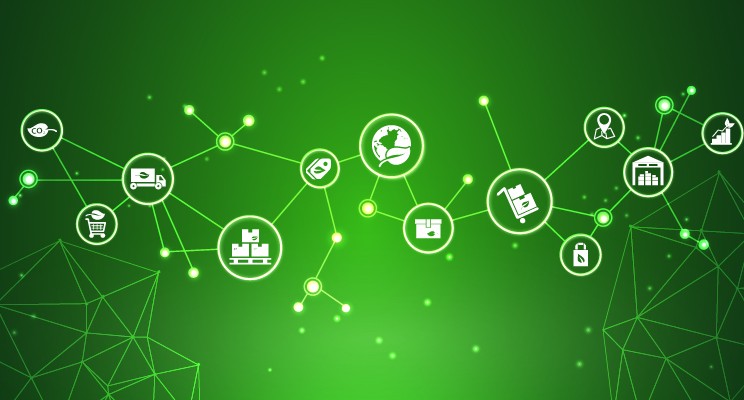By Shashi Kiran Shetty
“There must be a better way to make the things we want, a way that doesn’t spoil the sky, or the rain or the land” – the thoughtful quote of the world famous British vocalist and Beatles legend Paul McCartney always reminds us of the profound impact of an economic development that doesn’t endanger the environment. Logistics being the key driver and pace setter of the trade and economic development across the globe, greenness of the logistics, freight forwarding and supply chain operations is considered as a key yardstick to assess the environment sustainability of a business. As a result, developing strategies and implementing practices to minimize environmental and climate impact have become a critical part of the global supply chains.
In India, optimizing the transportation process, adopting fuel-efficient transportations and alternative energy and enhancing the share of rail transport are some of the critical operational and policy initiatives that the organizations and concerned government authorities have undertaken to boost environmental sustainability. However, transforming a traditional supply chain management framework into a resource efficient and environmentally sustainable one as well as significantly reducing energy consumption require new-age tech interventions. The concept of green logistics or green freight is based on the idea of building a fuel-efficient and carbon neutral transportation eco-system. Digitization of the operational framework builds the essential foundation to roll out a green logistics model.
Reducing impact, building green capabilities
Transportation makes up 21 percent of global carbon emissions. In a recently published article on the World Economic Forum page, Christian Brand, Associate Professor, Transport, Energy & Environment, University of Oxford painted a not-so-optimistic picture with this projection, “Even if current and committed policies were to succeed, transport’s carbon emissions would still grow almost 20 percent by 2050. Highly ambitious policies could cut these emissions by 70 percent per cent – but not to zero.”
However, with rapid adoption of digital and data-driven technologies, companies will be able to set up the pathway to substantially reduce emissions due to logistics movements and build a low-carbon economy. Developing real-time visibility, simplifying complex decision-making, introducing automation and cloud computing are some of tech-driven interventions capable of enhancing the sustainability quotient in the supply chain. Taking assured steps in the right direction can produce great results.
Adding green paradigm through technologies
The new breed of smart technologies such as machine learning, IoT, AI, etc. are becoming the new paradigm to embrace greener and sustainable logistics eco-systems. Algorithms powered by big data and AI are making the supply chain intelligent, predictive and collaborative. Algorithms analyze the prevailing situation to suggest best routes to limit fuel use while AI facilitates delivery prioritizations. By sharing the live transportation tracking details with their transportation partners, companies can optimize the process, decrease wastage, and make it cost-effective. There are fleet analytics tools that predict carbon emission per route. By strengthening the deep reinforcement learning, an organization can conveniently calculate the number of goods, time of shipping and most relevant vehicle type required.
AI-powered route planning brings in high-level accuracy by eliminating human errors. The launch of zero-emission and self-propelled container ship is an encouraging development. Studies suggest that AI-related technologies will contribute up to 70 percent of carbon emissions reductions by 2060 and logistics can make a significant contribution to the mission of reducing carbon emissions by adopting AI-powered technologies.
The Internet of Things (IoT) is also playing a pivotal role by bringing in fuel efficiency as well as waste reduction and infrastructure management capabilities. It helps in planning routes to reduce fuel consumption apart from tracking the consignment movements. Blockchain is making a huge impact in the supply chain to make the process of procurements to supply of goods transparent, effective and greener. The end-to-end tracking and traceability powered by the blockchain will have a lasting impact on reducing carbon footprint.
Making sustainability the backbone
At Allcargo Logistics, our focus has always been on reducing the impact of operations on the environment. As a part of that mission, we have digitised our global supply chain and domestic express logistics operations. For ECU360, global digital logistics platform, we are in the continued process of deploying automation, data analytics to further strengthen our service delivery competencies and network optimisation capabilities through superior route planning without affecting the environment. GATI Enterprise Management System (GEMS 2.0), the technology backbone of our express logistics arm Gati-KWE has been conceptualised to reduce environmental impact through effective warehouse management, route optimization and freight consolidation.
In addition, we have strengthened sustainability across our facilities and operations by adopting eco-friendly practices. We are also organising various programmes to help our management-level employees develop awareness on the importance of Sustainability and develop the skill sets relating to Environmental, Social and Governance aspects of sustainability, and best practices. At National Institute Industrial Engineering – Mumbai (NITIE) with which I am associated as the Chairman of the Society and Board of Governors has been successfully conducting a sustainability-based PGDSM programme which focuses on a People Planet and Profit approach. It introduces students to a systemic approach to evaluate environmental, social and economic impacts.
The digitalization is heralding a new era of greener logistics, taking into account transport, distribution and warehousing. Smart technologies have become a critical element in the process of building warehouse operations, optimizing fleet management and transport operations. As I mentioned before, freight movement is the backbone of economic development. Environmentally sustainable logistics operations facilitate greater adoption of sustainable development goals.
The recent geo-political developments and supply chain disruptions in China have prompted companies across the globe to look for a dependable sourcing and manufacturing destination which can emerge as the viable alternative to China. ESG improvement has become a part of the core focus for a lot of global corporations. If we offer them environmentally sustainable alternatives and policy stability, we’ll be able to assert ourselves in a more convincing way in the global supply chain eco-system.
Our larger goal should be to make India the global logistics and manufacturing hub. However, for that, we need to go out of the way to give back to the environment. As Harley Davidson CEO Jochen Zeitz once puts it aptly, “Sustainability is no longer about doing less harm. It’s about doing more good.” Designing tech-enabled logistics solutions is a great way to begin the journey towards environment sustainability. There is an environmental cost attached to the economic progress that the world has made over the last two decades. As United Nations Conference on Trade and Development (UNCTAD) rightly pointed out, it is about time to “decouple prosperity from CO2 emissions”. What’s encouraging to note is that more and more businesses are becoming aware of the environmental risks of growing and expanding operations and playing their part to achieve net-zero emissions by 2050. We need to do whatever it takes to reduce carbon emission – be it planting trees, reducing fuel consumption, switching to green energy, etc. Founder of Isha Foundation and one of the renowned spiritual leaders, Sadhguru Jaggi Vasudev has recently undertaken a 100-day motorbike journey from Europe to India covering 30,000 km as a part of the Foundation’s ‘Save Soil’ awareness campaign. The campaign puts the relevance of addressing soil degradation into sharp focus both nationally and globally. The mechanised and industrialised agricultural practices are adversely impacting the quality of the top layer of the soil. In a recently published interview, Sadhguru said that because of the degradation of soil quality, there could be a food crisis in the next 30 years. Hence, collective efforts are required from all of us to prevent the eventuality which will push humankind to disparity and insurmountable challenges. It’s an inspiring effort to build global awareness towards soil extinction. We can take a leaf out of Sadhguru’s book to do our bit for the environment. The goal is now for us to make economic growth sustainable, equitable and inclusive in the true sense.
Published by

Author : Mr.Shashi Kiran Shetty, Chairman, Allcargo Logistics; Chairman, ECU Worldwide; Chairman Gati and Chairman, NITIE


